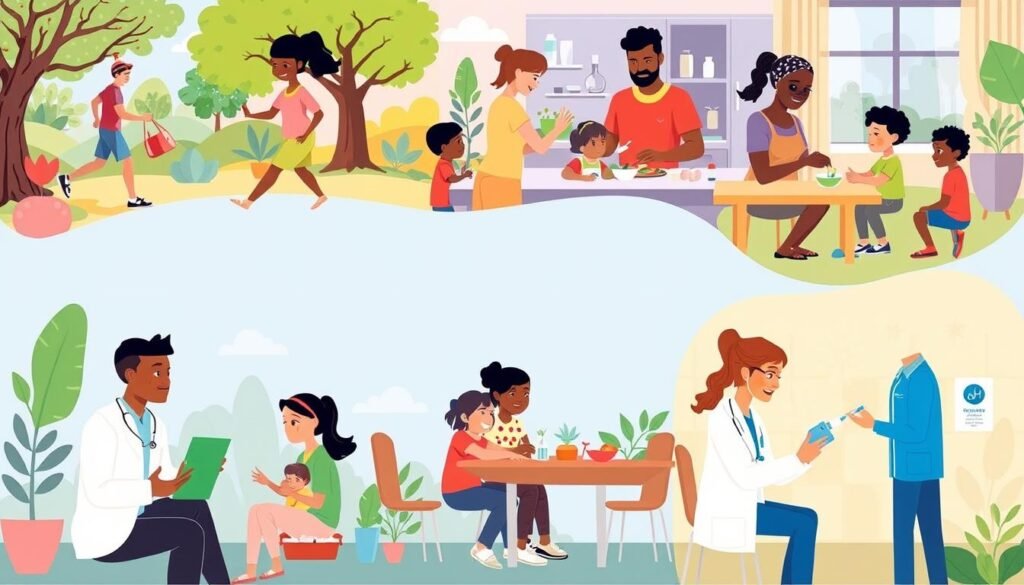Did you know your chances of getting sick increase significantly with a positive Family Health History (FHH)? In fact, the risk can double or even quadruple, especially if many first-degree relatives are affected. This fact highlights the crucial role family history has in assessing health risks. Knowing your family’s health history provides important clues about potential health issues due to genetics and inherited diseases.
Analyzing your family history helps in identifying personal health risks and prepares future generations. It allows individuals to adopt preventive health measures, seek genetic counseling, and get personalized risk evaluations. The insights from family histories are key in managing health risks. This leads to better health outcomes for all concerned.
Key Takeaways
- The odds of developing diseases can be significantly higher for those with a positive Family Health History.
- Family health history is the strongest predictor for diseases, particularly hereditary cancer syndromes.
- Understanding genetic predispositions can lead to better-informed health decisions.
- Gathering comprehensive family medical histories enhances the identification of high-risk patients.
- Utilizing family history tools can improve data recording efficiency.
- A detailed pedigree can reveal familial patterns essential for precision healthcare planning.
Introduction to Family History and Health Risk Assessment
Understanding your family history is key to assessing health risks. It helps you know if you’re more likely to get certain diseases. A study found that almost half of the participants had detailed family health information. This shows how important it is.
Family health history influences medical choices, especially for diseases like cancer, heart disease, and diabetes. Those with a family history of cancer had a higher risk of finding risky health variants. This highlights the importance of knowing your family health history for prevention.
Gathering detailed family medical histories is crucial for accurate health risk evaluation. Tools like MeTree help collect health info from up to four generations. This includes data on over 20 cancers and diseases like heart disease and diabetes. With this information, doctors can create personalized health risk reports.
Keeping your family health history current is vital. Talk to your relatives about their health and keep records. This not only improves your health knowledge but also helps you take preventive actions. Knowing your family history encourages proactive health decisions, leading to targeted interventions if needed.
The Importance of Family History in Assessing Risk
It’s vital to understand how family history impacts health risk assessment. Family Health History (FHH) gathers medical info about relatives. This helps spot patterns suggesting more risk for certain diseases. Healthcare workers use this to suggest how to avoid or better screen for these illnesses.
Understanding Family Health History (FHH)
Family Health History (FHH) helps predict disease risk and shape health choices. If chronic illnesses like cancer or heart disease are common in your family, your risk may be higher. Having a relative with these issues can significantly increase your chances, especially if many are affected or problems started young. It’s crucial to keep updating your family health record to reflect any major changes.
Impact of Family History on Disease Risk
Family history plays a huge role in understanding disease risk. If your family history is strong, your own risk could be double or more. This awareness is power. It lets you change your lifestyle to lower these risks. Tests like mammograms and blood sugar checks are key for catching issues early. For deeper insights, visit this source.
Genetic Predispositions and Hereditary Diseases
Understanding genetic predispositions helps us handle hereditary diseases better. Diseases like cystic fibrosis, Tay-Sachs disease, and sickle cell anemia show how our genes affect health. Knowing about these diseases allows people to manage their health better and make wise choices about preventive care.
Common Genetic Disorders
Genetic disorders come from mutations passed down by parents. These conditions can be serious, so it’s important to know about them. Some examples are:
- Cystic Fibrosis
- Tay-Sachs Disease
- Sickle Cell Anemia
- Huntington’s Disease
- Hemophilia
These diseases demonstrate the influence of genetics on our health. By understanding our genetic background, we can take early steps to protect our health.
Role of Genetics in Disease Development
Genetics and environmental factors both play a part in developing diseases. For example, carrying BRCA1 or BRCA2 mutations increases the risk for breast and ovarian cancers. This shows why genetic testing is key for identifying people at risk, even when there’s no clear family history. Genetic factors also play a role in chronic diseases like high blood pressure and cholesterol.
Genes don’t just impact disease risk; they guide treatment too. Preventive practices and regular check-ups are vital for managing hereditary diseases. For more details, explore resources such as genetic testing and assessing your family history.
Collecting Family Medical Histories
Collecting family medical histories is vital for evaluating health risks. It involves detailed record-keeping of health information across generations. This helps in understanding genetic predispositions and patterns within families. The right tools make it easier for both people and healthcare providers to manage this task.
Tools for Gathering Information
There are many tools designed for gathering family medical histories. A well-known approach utilizes family history questionnaires. These questionnaires help in noting down crucial medical details for a full health overview. Also, making detailed pedigrees can map out health patterns over generations. This visual aid helps in identifying risks linked to inherited conditions.

Family History Questionnaires and Pedigrees
Family history questionnaires focus on significant medical issues within families. They explore topics such as:
- Causes of death and the ages at which relatives have died
- When family members were diagnosed with specific conditions
- Ethnic backgrounds that could affect health risks
- Environmental factors influencing family health
Understanding these factors allows for better preventive strategies. Tools like “My Family Health Portrait” simplify this process. It’s particularly useful on National Family Health History Day, November 26. The key family members to include are:
- Parents
- Full- and half-siblings
- Grandparents
- Aunts and uncles
- Nieces and nephews
| Medical Condition | Discussion Points with Doctor |
|---|---|
| Breast Cancer | Mammograms at age-recommended intervals |
| Diabetes | Blood sugar testing guidelines |
| Colon Cancer | Colorectal cancer screening |
| Heart Disease | Heart health evaluation |
| Osteoporosis | Bone density testing |
Family history questionnaires and pedigrees play a critical role in healthcare. They help discover risk factors and genetic conditions that might not be obvious. This leads to better care and personalized health strategies. Documenting family health improves conversations with doctors and benefits future generations.
Multigenerational Risk Factors
It’s very important to understand multigenerational risk factors when we look at family health. These factors show the link between inherited conditions and future health risks across many generations. By examining family health records closely, doctors and nurses can spot trends that show the likelihood of certain diseases.
How Family Health Records Support Risk Assessment
Family health records are key in seeing the full picture of a family’s health history. They let us analyze risks that pass from one generation to the next, offering deep insights into common family illnesses. For example, if your grandma had high cholesterol, you might have a higher risk of it too.
Identifying Patterns Across Generations
Looking closely at family health histories helps us see potential health risks before they happen. We learn that issues like diabetes and obesity can run in families, showing the power of our genes. Say your great-grandma had diabetes; this could mean you’re more likely to have it as well.
| Health Condition | Associated Risk Factor | Odds Ratio (AOR) |
|---|---|---|
| Hyperlipidemia | Maternal History | 1.61 |
| Obesity | Maternal History | 1.77 |
| Depression | Maternal History | 1.87 |
| Diabetes | Maternal Grandfather History | 2.41 |
| Diabetes | Maternal Great Grandparent History | 3.05 |
These findings help doctors make better health decisions. They also guide how to prevent diseases better. By knowing our family’s health history, we and our doctors can take steps to stay healthy and manage possible illnesses early.
Preventive Healthcare Strategies
Preventive healthcare is key in improving health by making smart choices. Knowing your family’s health history helps doctors spot who might get sick and make plans to stop it before it starts. This way, we can avoid big health problems later.
Utilizing Family History for Tailored Prevention
Family history is crucial for creating personal health plans. It helps health experts give advice that fits you. They might suggest tests and check-ups that match your health risks. This makes sure you get care that works for you and your family’s health background.
Lifestyle Changes Based on Family History
Making changes in how you live can greatly better your health, using your family’s medical past as a guide. If your family has certain health issues, changing what you eat and how much you move is important. You should:
- Eat more fruits and veggies
- Exercise regularly for a strong heart
- Keep your weight healthy
- Stay away from smoking and too much drinking
Studies show that people who take part in prevention plans eat more greens and work out more. Yet, some folks go to the doctor less. This shows we need to keep teaching the value of regular health checks.

| Key Strategies | Impact on Health | Importance of Family History |
|---|---|---|
| Nutrition | Enhances immunity and reduces disease risk | Guides dietary choices based on predisposed risks |
| Exercise | Promotes cardiovascular health and weight management | Aids in developing tailored exercise regimens |
| Regular Screenings | Early detection of diseases | Identifies specific necessary screenings based on family history |
Preventive healthcare, with a nod to our family history, helps us choose better for our health. It makes health programs work better for everyone.
Genealogical Databases in Health Risk Assessment
Genealogical databases are key to collecting family histories linked to health risks. They tap into vast pools of family health data. This gives individuals and healthcare providers insights into possible genetic risks and conditions in families.
How Databases Enhance Family History Collection
Building accurate family trees is crucial for spotting disease patterns in families. Genealogical databases, such as Scotland’s People and the Utah Population Database, help in this. They offer detailed records that assist in tracking ancestry and health patterns. Researchers can identify hereditary risks through these databases. This knowledge significantly improves health risk assessments.
With these tools, healthcare professionals can more effectively tackle potential genetic conditions. They make addressing genetic risks easier and more precise.
Accessing Genetic Information for Better Outcomes
Connecting genealogical databases with genetic data leads to better healthcare choices. The Icelandic genealogy database and its Cancer Registry showcase how accurate health data can enhance managing genetic diseases. By looking at family health histories with clinical data links, people can pursue tailored preventive healthcare. Studies show the big potential of these databases in clinical genetics, especially in assessing risks.
| Database | Focus | Access |
|---|---|---|
| Scotland’s People | General genealogical research | Fee-based access to 50 million records |
| Utah Population Database (UPDB) | Utah residents’ health data | Research purposes only, 6.4 million records |
| Icelandic Genealogy Database | Ancestry tracing | Precise records of nearly all Icelanders since 1840 |
| Iceland’s Cancer Registry | Cancer diagnosis records | Mandatory reporting with high accuracy (99%) |
The merging of genealogical databases with health assessments can deepen our understanding of genetic conditions. Thus, it improves clinical outcomes. It also helps patients make informed healthcare decisions based on their family histories.
Genetic Counseling Services
Genetic counseling services are crucial in looking at family health histories and spotting inherited diseases. Genetic counselors use their expertise to help people understand genetic tests and what their family’s medical history means. With this knowledge, they guide patients towards making better health choices.
The Role of Genetic Counselors
Genetic counselors are experts who help make sense of genetic information. They help folks delve into family health histories and discuss testing options. More so, they explain the pros and cons of genetic tests. This ensures people have the info needed to make wise health decisions.
These counselors gather important details like family cancer stories, including who had cancer, at what age, and how they passed away. They might make a three-generation family tree to spot health patterns. This careful method helps find if there’s a higher risk for certain illnesses.
When to Seek Genetic Testing
People might look into genetic testing for many reasons, especially if there’s a strong family history of disease. Those with a history of certain cancers may need detailed follow-ups, even if tests show no genetic reasons. Knowing this can help in preventing illnesses and finding the best screening plans.

It’s important to understand family health stories for genetic counseling. This understanding helps individuals grasp their own health risks and what actions they can take. You can learn more about genetic health risks and how they might affect you by reading important research findings and specific info on genetics and lung cancer here.
Personalized Risk Assessments
Personalized risk assessments are vital in today’s healthcare. They use detailed health data to create specific risk profiles for people. These profiles take into account many factors. These include family history, age, lifestyle, and genetic traits. By doing so, health advice can be much more precise and helpful.
Knowing a person’s family health history helps spot potential health issues. This lets healthcare providers make plans that focus on each person’s unique needs.
Key Factors in Individual Risk Profiles
To build effective risk profiles, understanding several key factors is essential. These factors are crucial:
- Age: Different ages have different health risks.
- Lifestyle Choices: Diet, exercise, and habits play a big role in health.
- Family Health History: Knowing inherited health issues helps in risk assessment.
- Genetic Profiling: Genetics can tell us who might get certain diseases.
Emerging Technologies in Risk Assessment
New technologies are changing how we assess health risks. Tools like advanced analytics and AI mix health, genetic, and environment data. This makes health assessments more accurate.
- Improved Accuracy: Better data processing means we can predict health risks more reliably.
- Real-time Assessments: Getting constant health data updates helps in quick action.
- Customized Intervention Strategies: Personalized plans tackle the identified health risks better.
Conclusion
Family history plays a huge role in understanding health risks. Knowing about your family’s health can help spot personal health risks early on. This makes it easier to stop diseases before they start. Yet, many people think they are at less risk than they actually are.
For instance, studies show a big link between family history and the risk for colon cancer. However, up to 79% of people see themselves at lower risk, ignoring their family history. This shows a gap in how we view our health versus reality.
Tools like Family Healthware™ help doctors figure out who’s at risk by looking at family history. Sadly, not many know enough about their family’s health history. Less than one-third of Americans feel sure about their family’s cancer history. We need to know more about our family’s health risks.
This knowledge can push us to take better care of ourselves. If we keep track of our family’s health history, we can make smarter health decisions. And, it’s not just about us. It helps our kids and their kids live healthier lives too. Understanding and acting on our family history is crucial for a healthier future.